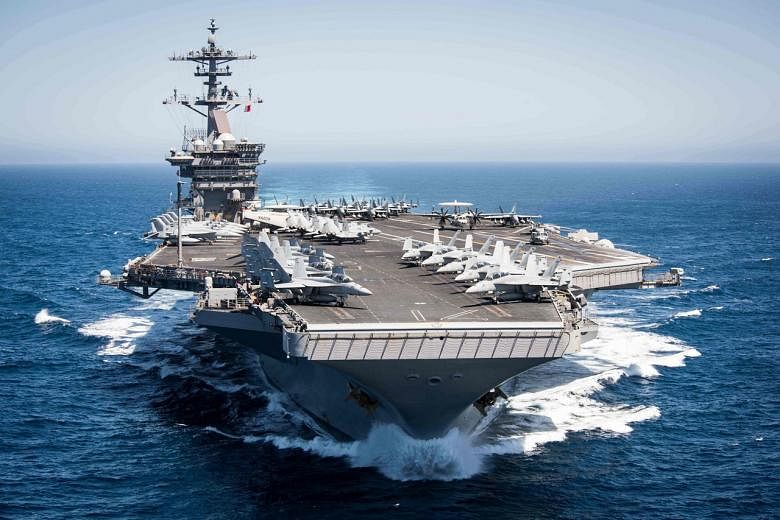NEW DELHI (THE STATESMAN/ASIA NEWS NETWORK) - While parts of the first three needed coronavirus stimulus packages unfortunately included unnecessary public spending for vested interests and pet projects, the equally important Phases 4 and 5 of the coronavirus relief stimulus packages must include a multi-year commitment to rearm America in key areas where the US is currently deficient in deterring a rising China.
Why start a robust defence spending blitz during a pandemic with sudden, widespread unemployment?
To preserve existing American jobs, create new employment opportunities and to invest in the weapons systems and capabilities necessary for defending against a China that is increasingly determined to push the United States out of the western Pacific and threaten its regional allies and partners.
The scope of the policy challenges posed by China today require investment of a nature and scale that deserves urgent attention.
While the Pentagon is right to seek additional funds - US$20.1 billion ($28.67) in additional spending between 2021 and 2026 - for strengthened deterrence against China once the Covid-19 crisis is under control, it needs to think bigger and ask for more money now given the opportunity afforded by the upcoming public spending bills that President Trump and Congress are working on to keep the American economy afloat during this crisis.
China's culpability in the creation and initial spread of the virus - as well as the ensuing coverup and mask diplomacy facade - is unbecoming of an emerging power and member of the community of nations.
Although it may be premature to draw hard conclusions right now, this recent behaviour suggests that Beijing is proving its critics right -that China is an adversary, not a competitor, to free peoples.
While America must work to maintain a productive and peaceful relationship with China, there is no guarantee that Beijing will conduct itself as a responsible player on the world stage.
Sadly, China's role in this coronavirus crisis adds fodder to its growing reputation of being a revisionist power that seeks to delegitimise democratic traditions and norms, bolster authoritarian regimes worldwide, subvert free trade and upend regional security.
China's increasing mistreatment of its own citizens is relevant to these considerations, as it contributes to the world's growing distrust of President Xi Jinping and supports a growing narrative: Beijing's repressive measures against its people - political dissidents, Uighur Muslims, Christians, and the brave medical professionals who spoke out against the Chinese Community Party's mishandling of the coronavirus outbreak - is an indication as to how China would act if it controlled facts on the ground outside its own borders.
Despite the fervent hopes of many, we cannot know at this point if China's conduct will change going forward.
Amid this uncertainty, Washington needs to act in good faith towards Beijing to seek common areas of cooperation.
This must be accompanied by a sustained effort to devote the resources necessary for bolstering US military capabilities in the Pacific to address new areas of vulnerability resulting from China's island building campaign that began during the Obama administration.
For starters, the US Navy does not have enough vessels.
Its current goal of growing to 355 ships is coming along at too slow of a pace given the changing dynamics of the Indo-Pacific and it may be that this number will be inadequate to meet upcoming challenges.
To address these urgent needs, the coming phases of coronavirus relief stimulus spending must include money for the navy to increase shipbuilding of sufficient numbers and quality to continue to allow for the US to operate beyond the second island chain in the Pacific and to address regional coercion by China.
An increased number of undersea warfare assets (submarines, etc.) as well as frigates, unmanned vessels and ships with enhanced stealth technologies are all in need.
Sufficient money must also be appropriated to fill Washington's current missile gap with Beijing.
In recent years, China has built the world's largest arsenal of short and intermediate-range ballistic and cruise missiles designed to destroy aircraft carriers as well as US bases in Japan and Guam.
This needs to be met by military spending in both Phase 4 and Phase 5 coronavirus relief stimulus packages to develop fresh concepts and adopt a revised US force posture.
A more dispersed US footprint of military installations in the region is needed to lessen the impact of Chinese missile attacks on the current handful of large US bases in the Pacific.
As part of this, funds will need to be allocated for the deployment of long-range land-based US missile systems throughout the Indo-Pacific to significantly raise the costs of Chinese aggression and thereby deter Beijing from using its missile arsenal against American and allied forces.
Additional needed areas of funding support involve radar and hypersonic weapons systems; intelligence-sharing centres with partners in Southeast Asia and Oceania; more frequent deployments of increased numbers of forces; joint exercises with allies; and measures to fortify existing US facilities in Japan, South Korea, Guam and Saipan.
Lastly, President Trump and Congress need to provide the confidence and certainty that these defence initiatives will be both job protectors and job creators for years to come.
This ought to be done by making an exception to the burdensome yearly defence appropriations process and to fund these programmes several years out.
Such arrangements would demonstrate to American workers, markets and US allies that Washington's commitment to invest in these needed capabilities and quality paying jobs is ironclad.
The writer is director of the Tribal Administration Program at Claremont Graduate University and writes on global affairs. The Statesman is a member of The Straits Times media partner Asia News Network, an alliance of 24 news media entities.

